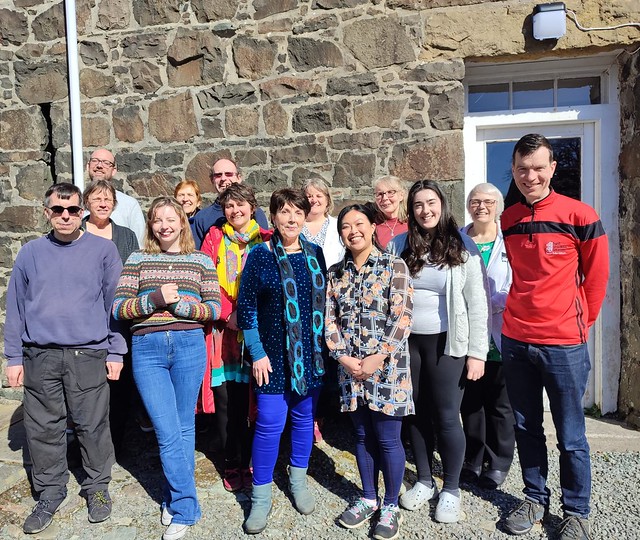Words for with, without, by and related things in Celtic languages.

Words marked with a * are reconstructions.
The emphatic forms of this word combined with personal pronouns are shown after the /.
| Proto-Celtic |
*letos = side |
| Old Irish (Goídelc) |
la [la] = with, beside, by, belonging to, among; in the language of, in the opinion of
lem(m), lim(m), leim, lium(m) / lemsa, li(u)msa = with me
lat(t) / latso, latsu = with you (sg)
leiss, les(s), lais(s), letha / le(i)som, laisem = with him
l(a)ee, lǽ / lési = with her
li(u)nn, le(i)nn, linn(a)i = with us
lib / libsi = with you (pl)
leu, léu leo, lethu / leusom, leosom = with them
lam = with my
lat = with your (sg)
lia = with his/hers/its/their
liar = with our
lassa = with, which |
| Middle Irish (Gaoidhealg) |
la = beside, by, touching, along with, in the same direction as, following to course of, in the company of
lem(m), lim(m), lium = with me
lat(t), let = with you (sg)
leiss, less, les = with him
lee, laee, lea = with her
lenn, leinn, linn = with us
lib = with you (pl)
leu, leo = with them |
| Irish (Gaeilge) |
le [lʲɛ] = with, to, for, by, against, in proximity to, in contact with, beside, towards, facing, open to, along the face of, in company with, at, against
liom / liomsa = with me
leat / leatsa = with you (sg)
leis / leis-sean = with him
léi / léise = with her
linn / linne = with us
libh / libhse = with you (pl)
leo / leosan = with them
le mo, lem = with my
le do, led = with your (sg)
lena = with his/hers/its
lenár = with our
lena = with their
le haghaidh = for, near, in store for |
| Scottish Gaelic (Gàidhlig) |
le [le] = with, by, using, in possession of, in favour of, downhill, downstream, lee(ward), port(side)
leam / leamsa = with me
leat / leatsa = with you (sg)
leis / leissan = with him
leatha / leathase = with her
leinn / leinne = with us
leibh / libhse = with you (pl/frm)
leotha / leothasan = with them |
| Manx (Gaelg) |
lesh [lɛʃ] = for, with, toward
lhiam / lhiams = with me
lhiat / lhiats = with you (sg)
lesh / leshsyn = with him
lhee / lheeish = with her
lhien / lhienyn = with us
lhiu / lhiuish = with you (pl)
lhieu / lhieusyn = with them |
Etymology: from Proto-Celtic *letos (side), which is possibly related to *ɸletos (side) [source].
Words for half, side, wide, broad and related things in Celtic languages possibly come from the same roots [more details].
| Proto-Celtic |
*writu = against
*writbero = to come against, return
*writkomfarsko- = to ask
*writtongo = to renounce |
| Old Irish (Goídelc) |
fri [fʲrʲi] = towards, against, along, beside, close to, on the point of
frimm, frium(m) / fri(u)msa = against me
frit(t), friut(t) / fritso, fritsu = against you (sg)
fris(s) / frissom, frissium = against him
frie = against her
frinn / finn(a)i = against us
frib / fribsi = against you (pl)
friu / friusom = against them |
| Middle Irish (Gaoidhealg) |
fri = towards, facing, turned to, against, alongside, by, next to, at, in contact with
frim(m), frium / fri(u)msa = against me
frit(t), friutt / fritsu = against you (sg)
fris(s) / frissom = against him
frie, friae / frise = against her
fri(u)nn, frind / finn(a)i = against us
frib, frithib / fribsi = against you (pl)
friu / friusom = against them |
| Irish (Gaeilge) |
re [rˠeː] = with, to, for, by, against (archaic, le is used instead)
fara [ˈfˠaɾˠə] = along, with, beside, in addition to (rare, used in Munster)
frae, fré [fˠɾˠeː] = with, along with (used in Connacht) |
| Scottish Gaelic (Gàidhlig) |
ri [rʲi] = against, busy with, engaged in, to, than
ruim/ ruimsa = against me
ruit / riutsa = against you (sg)
ris / ris-san = against him
rithe / rithese = against her
rinn / rinne = against us
ribh / ribhse = against you (pl)
riutha / riuthasan = against them |
| Manx (Gaelg) |
rish [rɪʃ] = along, beside, by, during, for
rhym / rhyms = to me
rhyt / rhyts = to you (sg)
rish / rishyn = to him
r’ee / r’eeish = to her
rooin / rooinyn = to us
riu / riuish = to you (pl)
roo / roosyn = to them |
| Old Welsh |
gurth = by, at, near |
| Middle Welsh (Kymraec) |
wrth, vrth, Ỽrth = by, at, near |
| Welsh (Cymraeg) |
(g)wrth [(g)ʊrθ / (g)ʊθ] = by, at, near, close to, opposite, facing, in contact with, on, against, also, with, beside, because of, as a result of, about, concerning
wrth angen = according to need, as necessary
wrth angor = at anchor
wrth fron = near, close to, at the point of, almost
wrth law, wrth y llaw = nearby, at hand, by hand
wrth fynd heibio = in passing (of comment)
wrth ben = on top of, above, over |
| Old Cornish |
gurth = by |
| Middle Cornish (Cernewec) |
(w)orth = at, by, to, for, with
(w)orthyf of/from/to/against me
(w)orthys = of/from/to/against thee
(w)orto = by/upon him or it
(w)orty = by/upon her or it
(w)orthyn = of/from/to/against us
(w)ortheuch = of/from/to you
orte, worté = by/upon them |
| Cornish (Kernewek) |
orth = against, at
orth ow brys = in my opinion
orth bodh ow brys = intentionally
orth niver = in number |
| Middle Breton (Brezonec) |
oz, ouz, ouc’h, oud = against, to, of, opposite |
| Breton (Brezhoneg) |
ouzh [us] = towards, to, against
ouzh beg = below, at the bottom (of)
diouzh [ˈdiːus/ˈdjuːs] = of, according to
diouzh re = in case of need, if necessary
diouzhtu [djusˈtyː] = immediately |
Etymology: from Proto-Indo-European *wert- (to turn) [source].
Conjugated forms in Welsh, Cornish and Breton
English words from the same PIE root include divert, invert, pervert, verse, verus, vortex and worth [source].
| Proto-Celtic |
*kanta = together with
*kantyos = assembly, gathering |
| Gaulish |
*kantyos = assembly, gathering
cantio = assembly, gathering |
| Old Irish (Goídelc) |
cét- = with
céite = assembly, hill, mound |
| Middle Irish (Gaoidhealg) |
cét- = with
céite = hill, mound, open space, racecourse, meeting-place, assembly, square, market-place |
| Old Welsh |
cant = by, at, near |
| Middle Welsh (Kymraec) |
can, cann, gen, gant, gan = with, together with
genhyf = with me
genhyt = with thee
gant(h)aw = with him or it
gent(h)i = with her or it
genhym, genhyn, gennyn = with us
genhwch, gennwch = with you
gantu(d), gantunt, ganthud = with them
gid, y gyd, kyd, gyt = with, together with |
| Welsh (Cymraeg) |
gan [ɡan] = with, together with, alongside, beside, by (means of), through, because of, on account of, from , of
gyda = with, together with, in addition to, in the company of, close by, next to, alongside, besides, for |
| Old Cornish |
cant, cans = with, by |
| Middle Cornish (Cernewec) |
gan, gans = with, by
genef, gynef = with me
genes, gynes = with thee
ganso = with him or it
gynsy = with her or it
genen, gynen = with us
geneuch = with you
gansé = with them |
| Cornish (Kernewek) |
gans = by, with
gans ganow = by word of mouth
gans golow, gans tan = alight, lit
gans henna = thereby
gans oll ow holon vy = sincerely yours
gans pub bolonjedh da = with all good wishes |
| Middle Breton (Brezonec) |
gant = with, on the occasion of, so much |
| Breton (Brezhoneg) |
gant [ˈɡãnt] = with, because of
digant = with, of |
Etymology: from Proto-Indo-European *ḱóm (with) [source].
Conjugated forms in Welsh, Cornish and Breton
| Proto-Celtic |
*sekʷo- = besides, without |
| Old Irish (Goídelc) |
sech [sʲex] = past, beyond, different from, more than
sechum = different from me
sechut = different from you (sg)
sech(a)e, sechæ = different from him
secce = different from her
sechund = different from us
seccu = different from them |
| Middle Irish (Gaoidhealg) |
sech = past, beyond, different from, more than,
sechum, seacham , seocham = different from me
sechut, seachad, seochad = different from you (sg)
(se)chae, secha, sechai = different from him
seochu, seacha = different from him
secci, seicce, seice = different from her
sechund, sechoind, seachoinn = different from us
sechaib = different from you (pl)
seccu, seocu, seoca = different from them |
| Irish (Gaeilge) |
seach [ʃax] = by, past, beyond, other than, more than |
| Scottish Gaelic (Gàidhlig) |
seach [ʃɛx] = compared with/to, in preference to, past, by, rather than
seach-rathad = bypass, relief road, byway
seach-thìm = overtime |
| Manx (Gaelg) |
shagh [ʃax] = past
shaghey = bye, bygone, past, delay, prolong, neglected
shiaghey = past
shagh-votal = proxy vote
shagh-chlou = offprint
shagh-teiyder = proxy |
| Proto-Brythonic |
*heb = besides, without |
| Old Welsh |
hep = without |
| Middle Welsh (Kymraec) |
heb, hep = without, past
hebof, hebofy = without me
hebot = without thee
hebddaw = without him or it
hebddi, hebdi, hebti = without her or it
hebom, heibom = without us
heboch = without you
hebddudd = without them
heb law, hebillaw, heb-law = besides, not counting
eb vn ail = without peer, incomparable, unrivalled
heb annot = without delay, immediately |
| Welsh (Cymraeg) |
heb [hɛb/heːb] = without, minus, free from, void of, lacking, in the absence of, past, besides, in addition to, not including, excluding, apart from,
heblaw = besides, not counting, over and above, in addition to, except, but, without, past
heb ei ail, heb (un) ail = without peer, incomparable, unrivalled
heb annod = without delay, immediately |
| Middle Cornish (Cernewec) |
heb, hep = without, destitute, void of
hebford = without a road |
| Cornish (Kernewek) |
heb = witout
heb ahwer = readily
heb bri = irrelevant
heb danjer = safely
heb difuna = dormant
heb diwedh = endlessly, continuously, eternal |
| Old Breton |
ep = without |
| Middle Breton (Brezonec) |
hep, hemp, eb = without
hep quen, ep quen, hemb kin, epken = only
hep muy, hep-mui = without further …, only
hep muy quen, hep mui quen = only |
| Breton (Brezhoneg) |
hep [hep] = without
hepken = only, exclusiveness
hepmuiken = without further … |
Etymology: from Proto-Indo-European *sekʷ- (to follow) or from *sek- (to cut) [source].
Conjugated forms in Welsh, Cornish and Breton
English words from the same PIE root include sect, sign, signal, social, sue, suit, suite [source].
| Proto-Celtic |
*kina = on this side of |
| Old Irish (Goídelc) |
cen [kʲen] = except, without, unbeknownst to, unknown to
cene, cenae [ˈkʲene] = besides, in any case, already
olchene, olchenae [olˈxʲene] = besides, the other(s), the rest |
| Middle Irish (Gaoidhealg) |
cen, cin, can, gen, gin, gan = on this side of, apart from, besides, except, without, -less |
| Irish (Gaeilge) |
gan [ɡən̪ˠ/ɡan̪ˠ] = without, not
gan amhras = undoubtedly
gan fáth gan ábhar = for no reason whatever
gan fhios = unknown, secretly
gan on = faultless, unblemished |
| Scottish Gaelic (Gàidhlig) |
gun [ɡən̪ˠ] = without, not
gun chiall = without sense, senseless, insane
gun fhiù = worthless, trashy, trivial
gun iarraidh = unwanted, unbidden, unsought
gun mhaille = forthwith
gun sgot = clueless |
| Manx (Gaelg) |
gyn = ex, un-, devoid, without
gyn baare = pointless
gyn bun = baseless, bogus, unfounded
gyn currym = carefree, unencumbered
gyn ennym = anonymous, nameless, unnamed
gyn feill = vegetarian |
| Middle Breton (Brezonec) |
quen, quin, gen, ken = no more, other |
| Breton (Brezhoneg) |
ken [ˈkɛnː] = other, only, no more |
Etymology: from Proto-Indo-European *ḱe (this, here) [source].
Words marked with a * are reconstructions.
Sources: Wiktionary, Am Faclair Beag, Online Manx Dictionary, Teanglann.ie, eDIL – Electronic Dictionary of the Irish Language, In Dúil Bélrai English – Old Irish glossary, Geiriadur Prifysgol Cymru, Gerlyver Kernewek, Dictionaire Favereau, TermOfis, English – ProtoCeltic WordList (PDF), Etymological Dictionary Of Proto Celtic







